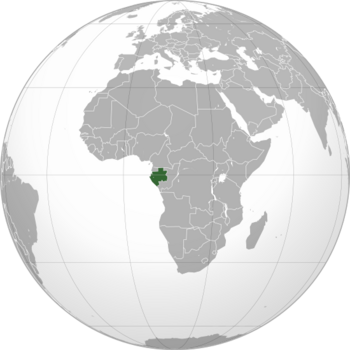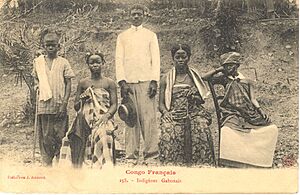History of Gabon facts for kids
The history of Gabon is a fascinating journey through time. Before Europeans arrived, not much was written down about Gabon. However, we know that Bantu people started settling in the area around the 14th century. Later, in the late 1400s, Portuguese explorers and traders came to the coast. This area then became a hub for the Atlantic slave trade, with European traders arriving in the 1500s.
In the 1800s, France took control, establishing a protectorate over the coast. In 1849, a group of freed captives from a slave ship founded the city of Libreville. France gradually expanded its control over the entire country by the late 1800s. In 1910, Gabon became part of French Equatorial Africa. Finally, in 1960, Gabon gained its independence.
After independence, Gabon had two main political parties. These were the Gabonese Democratic Bloc (BDG) and the Gabonese Democratic and Social Union (UDSG). The leaders decided to work together, and Léon M'Ba became president in 1961. However, this unity didn't last. In 1964, there was a short, peaceful change in government. Later, Omar Bongo became president and made Gabon a one-party state. Major political changes in 1990 brought back multi-party elections. Bongo remained president until he passed away in 2009.
Contents
Gabon's Early History
The earliest known people in Gabon were the Pygmies. Around 1000 AD, Bantu peoples, like the Fang, moved into the area. They gradually replaced the Pygmy societies. We don't know much about their daily lives before Europeans arrived. But their amazing tribal art shows they had a rich culture.
The first Europeans to visit Gabon were Portuguese explorers and traders. They arrived in the late 1400s. At that time, the southern coast was controlled by the Kingdom of Loango. The Portuguese settled on nearby islands like São Tomé and Príncipe. But they often visited the Gabonese coast.
They named the region "Gabon" after the Portuguese word gabão. This word means a coat with a sleeve and hood. The shape of the Komo River estuary reminded them of this coat. More European traders came in the 1500s. They traded for slaves, ivory, and valuable tropical woods.
Gabon Under French Rule
In 1838 and 1841, France began to take control of Gabon. They signed agreements with local chiefs to create a protectorate over the coastal areas. This meant France would protect and control these regions.
American missionaries from New England set up a mission in 1842. It was located at the mouth of the Komo River. In 1849, French officials stopped an illegal slave ship. They freed the captives who were on board. These freed people were released near the mission station. They then started a new settlement. They called it Libreville, which means "free town" in French.
Between 1862 and 1887, French explorers ventured into Gabon's thick jungles. The most famous explorer was Pierre Savorgnan de Brazza. He used Gabonese helpers and guides. They helped him search for the source of the Congo River. France officially took over Gabon in 1885. However, they didn't fully govern it until 1903. Gabon's first political group, the Jeunesse Gabonais, was formed around 1922.
In 1910, Gabon became one of four territories in French Equatorial Africa. On July 15, 1960, France agreed to Gabon becoming fully independent. Just over a month later, on August 17, 1960, Gabon officially became an independent country.
Gabon's Independence and New Leaders
Quick facts for kids
Gabonese Republic
République gabonaise (French)
|
|
|---|---|
| 1968–1990 | |
|
|
|
 |
|
| Capital | Libreville |
| Government | One-party republic |
| President | |
|
• 1968–1990
|
Omar Bongo |
| Prime Minister | |
|
• 1975–1990
|
Léon Mébiame |
| Vice President | |
|
• 1968–1975
|
Léon Mébiame |
| History | |
|
• 1967 general election
|
19 March 1967 |
|
• One-party system started
|
12 March 1968 |
|
• Multi-party election
|
16 September 1990 |
| Currency | CFA franc |
| ISO 3166 code | GA |
| Today part of | Gabon |
When Gabon became independent in 1960, there were two main political parties. These were the Gabonese Democratic Bloc (BDG), led by Léon M'Ba, and the Gabonese Democratic and Social Union (UDSG), led by Jean-Hilaire Aubame. In the first election after independence, neither party won a clear majority.
The BDG gained support from some independent lawmakers. So, M'Ba became the Prime Minister. Soon, the leaders decided that Gabon was too small for two competing parties. They agreed to run together on a single list of candidates. In the February 1961 election, M'Ba became president. Aubame became the foreign minister.
This one-party system seemed to work for a while. But in February 1963, the larger BDG party pressured the UDSG members. They had to either join the BDG or resign. The UDSG ministers chose to resign. M'Ba then called for new elections in February 1964. He also reduced the number of lawmakers in the National Assembly. The UDSG couldn't find enough candidates to meet the election rules.
When it looked like the BDG would win easily, the Gabonese military stepped in. They briefly removed M'Ba from power in a peaceful way on February 18, 1964. However, French troops quickly helped to put his government back in charge the next day. New elections were held in April 1964. Many opposition groups took part this time. Candidates supported by the BDG won 31 seats, while the opposition won 16.
In late 1966, the constitution was changed. This change meant that if the president died, the vice president would automatically take over. In March 1967, Léon M'Ba and Omar Bongo (who was then known as Albert Bongo) were elected President and Vice President. The BDG won all 47 seats in the National Assembly. M'Ba passed away later that year, and Omar Bongo became president.
In March 1968, Bongo declared Gabon a one-party state. He dissolved the BDG and created a new party called the Gabonese Democratic Party (PDG). He invited all Gabonese people to join, no matter their past political views. Bongo was elected president again in February 1973. In April 1975, the position of vice president was removed. It was replaced by a prime minister, who would not automatically become president. Bongo was re-elected president in 1979 and 1986 for seven-year terms. He used the PDG to try and unite the country. He wanted to overcome the regional and tribal differences that had caused problems in the past.
In early 1990, people were unhappy about the economy. They also wanted more political freedom. This led to protests and strikes by students and workers. President Bongo responded by negotiating with workers. He made important agreements about wages. He also promised to make the PDG more open. He organized a national political meeting in March–April 1990. This meeting was to discuss Gabon's future political system. The PDG and 74 other political groups attended. The groups mostly split into two sides: the ruling PDG and its allies, and the United Front of Opposition Associations and Parties.
The April 1990 meeting approved big political changes. These included creating a national Senate and giving more power to local governments. They also allowed freedom of assembly and the press. To guide Gabon towards a multi-party democracy, Bongo stepped down as PDG chairman. He created a temporary government led by a new Prime Minister, Casimir Oyé-Mba. This new government, called the Gabonese Social Democratic Grouping (RSDG), was smaller. It included members from several opposition parties. The RSDG wrote a temporary constitution in May 1990. It included basic rights and an independent court system. But it still gave the president strong powers. After more review, this document became law in March 1991. Under the 1991 constitution, if the president died, the Prime Minister, the National Assembly president, and the defense minister would share power until a new election.
However, opposition to the PDG continued. In September 1990, two attempts to overthrow the government were stopped. Despite protests after an opposition leader died, the first multi-party National Assembly elections in almost 30 years took place in September–October 1990. The PDG won a large majority of seats.
After President Bongo was re-elected in December 1993 with 51% of the votes, opposition candidates said the results were not fair. Serious public unrest followed. This led to an agreement between the government and opposition groups to find a political solution. These talks resulted in the Paris Accords in November 1994. Under this agreement, several opposition figures joined a government of national unity. Constitutional changes were also approved in a referendum in 1995. However, this arrangement soon fell apart. The legislative and local elections in 1996 and 1997 brought back strong party politics. The PDG won a huge victory in the legislative election. But several major cities, including Libreville, elected opposition mayors in the 1997 local elections.
Gabon in Modern Times
President Bongo was easily re-elected in December 1998 and November 2005. He won with large majorities against a divided opposition. While his main opponents claimed the results were unfair, some international observers said the results were generally accurate. Legislative elections in 2001–2002 were boycotted by some smaller opposition parties. They were also criticized for being poorly organized. These elections resulted in the National Assembly being almost completely controlled by the PDG and its allies.
Omar Bongo passed away at a hospital in Spain on June 8, 2009.
His son, Ali Bongo Ondimba, was elected president in the August 2009 presidential election. He was re-elected in August 2016. However, those elections had many problems, including irregularities, arrests, human rights violations, and violence after the election.
On October 24, 2018, Ali Bongo Ondimba was hospitalized in Riyadh for an illness that was not publicly announced. On November 29, 2018, Bongo was moved to a military hospital in Rabat to continue his recovery. On December 9, 2018, Gabon's Vice President Moussavou reported that Bongo had a stroke in Riyadh. He had since left the hospital in Rabat and was recovering at a private home there. Since October 24, 2018, Bongo had not been seen in public. Because there was no clear proof that he was alive or dead, many people wondered if he was truly alive. On January 1, 2019, Bongo gave his first public speech since falling ill. It was a video posted on social media, which helped stop rumors that he had died.
On January 7, 2019, soldiers in Gabon tried to overthrow the government. However, this coup attempt was not successful.
On May 11, 2021, a delegation from the Commonwealth visited Gabon. This happened as Ali Bongo visited London to meet with the secretary general of the organization. The Commonwealth includes 54 English-speaking countries. President Bongo said Gabon wanted to join the Commonwealth. In June 2022, Gabon officially joined the Commonwealth as its 55th member.
In August 2023, it was announced that Ali Bongo had won a third term in the general election. However, military officers then announced that they had taken power in a coup d'état. They canceled the election results. They also dissolved government bodies like the courts, Parliament, and the constitutional assembly. On August 31, 2023, the army officers who seized power named General Brice Oligui Nguema as the country's temporary leader. This ended the Bongo family's 55-year rule. On September 4, 2023, General Nguema was sworn in as the interim president of Gabon.
See also
 In Spanish: Historia de Gabón para niños
In Spanish: Historia de Gabón para niños
- History of Africa
- List of heads of government of Gabon
- List of heads of state of Gabon
- Politics of Gabon
- Libreville history and timeline




